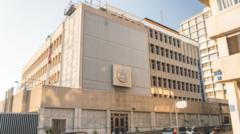The case highlights ongoing issues surrounding freedom of speech and human rights in Thailand, as U.S. officials seek access to Chambers.
American Academic Detained in Thailand Sparks Concerns Over Lèse-Majesté Laws

American Academic Detained in Thailand Sparks Concerns Over Lèse-Majesté Laws
U.S. officials express alarm over the arrest of Paul Chambers, an American lecturer, following criticism of the Thai monarchy under stringent laws.
The recent detention of an American academic in Thailand has raised significant concern among U.S. officials. Paul Chambers, a lecturer specializing in civil-military relations at Naresuan University, was apprehended under Thailand's strict lèse-majesté laws, which prohibit any form of insult or criticism against the monarchy. The U.S. State Department has expressed alarm over this incident, marking it as a rare occurrence where a foreign citizen faces legal action under such laws.
Chambers is reportedly facing charges not only under the lèse-majesté laws but also under the Computer Crimes Act, according to Tammy Bruce, a State Department spokeswoman. The department is currently in communication with Thai authorities regarding his case. The lèse-majesté laws in Thailand are known to be severely punitive, typically resulting in a minimum three-year sentence, but can extend up to fifteen years for serious infractions. Critics, including various human rights organizations, have condemned these laws as a major barrier to free expression.
Although the Thai courts are expected to reach decisions on numerous lèse-majesté cases this year, the arrest of a foreigner emphasizes the sensitivity surrounding such legislation. “This case reinforces our longstanding concerns about the use of lèse-majesté laws in Thailand,” Bruce stated, urging the Thai government to uphold freedom of expression. Furthermore, U.S. consular officials in Bangkok have requested access to Chambers to ensure his fair treatment, reflecting the importance the U.S. places on its treaty alliance with Thailand.
Chambers is reportedly facing charges not only under the lèse-majesté laws but also under the Computer Crimes Act, according to Tammy Bruce, a State Department spokeswoman. The department is currently in communication with Thai authorities regarding his case. The lèse-majesté laws in Thailand are known to be severely punitive, typically resulting in a minimum three-year sentence, but can extend up to fifteen years for serious infractions. Critics, including various human rights organizations, have condemned these laws as a major barrier to free expression.
Although the Thai courts are expected to reach decisions on numerous lèse-majesté cases this year, the arrest of a foreigner emphasizes the sensitivity surrounding such legislation. “This case reinforces our longstanding concerns about the use of lèse-majesté laws in Thailand,” Bruce stated, urging the Thai government to uphold freedom of expression. Furthermore, U.S. consular officials in Bangkok have requested access to Chambers to ensure his fair treatment, reflecting the importance the U.S. places on its treaty alliance with Thailand.






















